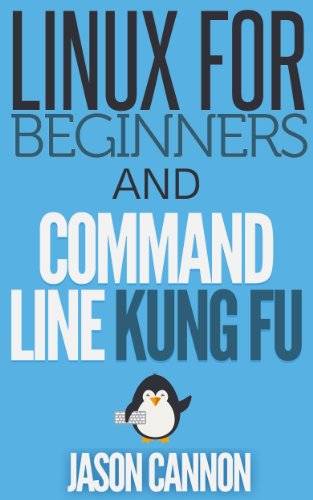Great place to start. Very easy to understand. Keep doing the hard work. I will keep in my library as future reference


Linux for Beginners and Command Line Kung Fu (Bundle): An Introduction to the Linux Operating System and Command Line
by Jason Cannon
Save when you buy this two book bundle - Linux for Beginners AND Command Line Kung Fu
Linux for Beginners information:
If you want to learn how to use Linux, but don't know where to start read on.
Knowing where to start when learning a new skill can be a challenge, especially when the topic seems so vast. There can be so much information available that you can't even decide where to start. Or worse, you start down the path of learning and quickly discover too many concepts, commands, and nuances that aren't explained. This kind of experience is frustrating and leaves you with more questions than answers.
Linux for Beginners doesn't make any assumptions about your background or knowledge of Linux. You need no prior knowledge to benefit from this book. You will be guided step by step using a logical and systematic approach. As new concepts, commands, or jargon are encountered they are explained in plain language, making it easy for anyone to understand.
Here is what you will learn by reading Linux for Beginners:
- How to get access to a Linux server if you don't already.
- What a Linux distribution is and which one to choose.
- What software is needed to connect to Linux from Mac and Windows computers. Screenshots included.
- What SSH is and how to use it, including creating and using SSH keys.
- The file system layout of Linux systems and where to find programs, configurations, and documentation.
- The basic Linux commands you'll use most often.
- Creating, renaming, moving, and deleting directories.
- Listing, reading, creating, editing, copying, and deleting files.
- Exactly how permissions work and how to decipher the most cryptic Linux permissions with ease.
- How to use the nano, vi, and emacs editors.
- Two methods to search for files and directories.
- How to compare the contents of files.
- What pipes are, why they are useful, and how to use them.
- How and why to redirect input and output from applications.
- How to customize your shell prompt.
- How to be efficient at the command line by using aliases, tab completion, and your shell history.
- How to schedule and automate jobs using cron.
- How to switch users and run processes as others.
- Where to go for even more in-depth coverage on each topic.
Command Line Kung Fu information:
Become a Linux Ninja with Command Line Kung Fu!
Do you think you have to lock yourself in a basement reading cryptic man pages for months on end in order to have ninja like command line skills?
In reality, if you had someone share their most powerful command line tips, tricks, and patterns you'd save yourself a lot of time and frustration. What if you could look over the shoulder of a good friend that just happened to be a command line guru? What if they not only showed you the commands they were using, but why they were using them and exactly how they worked? And what if that friend took the time to write all of it down so you can refer to it whenever you liked?
Well, a friend did just that. Command Line Kung Fu is packed with dozens of tips and over 100 practical real-world examples. You won't find theoretical examples in this book. The examples demonstrate how to solve actual problems and accomplish worthwhile goals.
The tactics are easy to find, too. Each chapter covers a specific topic and groups related tips and examples together. For example, if you need help extracting text from a file look in the "Text Processing and Manipulation" chapter.
Also, a comprehensive index is included. If you want to find every example where a given command is used -- even if it's not the main subject of the tip -- look in the index. It will list every single place in the book where that command appears.
Reviews
If you’re new to Unix world and unaware of it’s capabilities, this is a good book to start with. Successfully generates interest in amazing Linux world!!
Jason is the man for Linux information. I have his books and have taken his video courses. Well worth the money.
Incredibly informative and easy to follow along. I started with several other "... for beginners" books and they were poorly edited, difficult to follow, and/or too short to give you any kind of competency with the OS.
I've used this book to refresh my knowledge in Linux and it really served me well. The Kung Fu thing on this book is real!
This is the fourth "Intro to Linux" book I have read in the past two weeks; but the first one that was worth reading. Very clear descriptions with many excellent examples.
Great book if your learning Linux, started learning Ubuntu server and I had no issues. Use a VM with this book.
I ordered this kindle book when I first started using my Linux computer and needed to get a grep (pun intended) on how to use the command line.
It's written with so many run on sentences, and in a way that's not very direct/clear.
Examples that don't seem to illustrate the idea clearly. Most especially the diagrams. They need more finesse. It's an unfortunate case of self publishing likely, and please hire an editor. I re-read this book after reading another command line book and taking a unix course, to better understand the finer points. While the points are important, they're not written as a BEGINNERS book as you'd indicated in the title.


